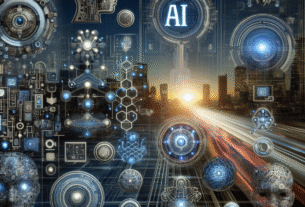# Exploring the Role of Artificial Intelligence in Healthcare: Innovations and Challenges
## Introduction
Ah, artificial intelligence (AI)—the digital brainchild that promised us robot helpers, flying cars, and reruns of our favorite TV shows without having to touch the remote. While we may not have achieved all those sci-fi dreams (yet!), AI is changing and improving industries all over the world. Like an artist using paints, AI uses data and logic to create new ideas that are transforming different fields, with healthcare being one of the most exciting of them all.
In this fun look at AI in healthcare, we’ll uncover the new ideas that smart folks are developing. From diagnosing like Dr. House to understanding our genes like a wise friend, AI is working wonders in hospitals, labs, and clinics all over. But, for every new thing, there’s a challenge—for every yin, there’s a yang. This post will explore these cool technologies and the difficulties we face on this journey.
## The Current Landscape of AI in Healthcare
Before we dive into the details, let’s get a big-picture view of AI in healthcare. Technology is advancing as quickly as a racing car; AI is changing how medical data is handled, diseases are spotted, and treatments are personalized. According to recent info, the healthcare AI market is expected to reach $45 billion by 2026. It’s like having Tony Stark’s Jarvis doing rounds in the hospital. Big medical centers are using AI systems to help doctors make better decisions, quickly sorting through huge amounts of data faster than you can say “supercalifragilisticexpialidocious.”
## Innovations in AI for Healthcare
### 1. AI in Diagnostics
Imagine AI wearing Sherlock Holmes’ detective hat! AI makes diagnoses more accurate by examining complex datasets with incredible intelligence. It’s like having a doctor, a supercomputer, and a crystal ball all in one. Companies like PathAI and Zebra Medical Vision are leading the way, using AI tools to improve the accuracy and speed of diagnosing diseases like cancer and heart conditions. Hospitals are seeing fewer mistakes, and patients are getting quicker, more accurate results—everyone wins!
### 2. Personalized Medicine
AI in personalized medicine is changing how treatment plans are made, creating them as special as your favorite playlist. By analyzing genetic data, AI can suggest treatment plans tailored to your unique genetic code. Companies like Deep Genomics are digging into your DNA to develop customized therapies. Patients receive treatments suited to their genetic makeup, turning a potential noise into a harmonious tune.
### 3. Predictive Analytics and Patient Monitoring
Who needs a Magic 8 Ball when you have AI’s predictive analytics? AI uses information like electronic health records and patient history to predict outcomes, flag potential problems, and perhaps even foresee the future (well, maybe not yet). AI-driven patient monitoring systems can alert healthcare providers to issues even before symptoms show up, leading to proactive care and possibly saving lives. Many examples exist, with systems that significantly cut down on readmission rates and improve recovery times.
### 4. AI in Medical Imaging
AI and medical imaging go together like peanut butter and jelly—a perfect team. Advanced AI algorithms improve image accuracy and help radiologists better understand images with incredible precision. Companies like Aidoc and Butterfly Network are at the forefront of this area. These tools speed up radiological processing and enable precise detection, bringing a new era of AI-enhanced care.
### 5. Robotics and AI in Surgery
Scalpel? Check. Robot with AI-enhanced skills? Double-check! Robotics in surgery is changing, giving surgeons incredible precision and control. Talk about solving complex problems! AI in robotic surgical systems means less invasive procedures and quicker recoveries. Companies like Intuitive Surgical are on the cutting edge, taking surgical precision to new heights.
### 6. Virtual Health Assistants and Chatbots
Alexa, Siri, and now Dr. Bot! AI-powered virtual health assistants and chatbots are improving patient interaction, providing support and information 24/7. Apps like Ada and Babylon Health are making medical information more accessible, offering consultations and advice with just a tap. Patients receive timely, accurate information without leaving the comfort of their homes!
### 7. AI in Drug Discovery and Development
AI is introducing a new way in drug discovery. Speeding up research like a caffeine-fueled race, AI is helping pharmaceutical companies shorten the drug development process. AI-driven models can predict successful compounds faster than traditional methods. AI’s contribution in this area has already led to breakthroughs, reducing the time and cost of bringing important new treatments to patients.
## Challenges Facing AI in Healthcare
But alas, with great power comes great responsibility—and a bit of controversy. Let’s explore the challenges that AI faces.
### 1. Ethical Concerns and Bias
AI can sometimes be as biased as your aunt with her special holiday seasonings. Ensuring fairness, transparency, and removing biases from AI algorithms is important, especially when these systems affect diverse groups of people. Correcting these biases and making ethical decisions is an ongoing challenge for developers.
### 2. Data Privacy and Security
Trusting AI systems with sensitive health data is like giving your diary to a stranger—it takes trust. With cyber threats always present, protecting data and following rules like HIPAA and GDPR is crucial for maintaining patient confidentiality.
### 3. Integration with Existing Systems
Incorporating AI into traditional healthcare systems is like teaching an old dog new tricks. Ensuring compatibility and smooth operation between shiny AI systems and existing electronic health records (EHR) can feel like untangling tangled lights stored away for a year.
### 4. Reliability and Trust
Building trust in AI systems is crucial. People tend to trust real doctors more than they do a computer giving them medical advice. Ensuring reliability, minimizing mistakes, and providing clarity about AI-driven decisions are essential for gaining trust among patients and healthcare providers.
### 5. Regulations and Oversight
The legal landscape for AI in healthcare is complex with much potential for missteps. Navigating regulations involves government agencies and international bodies keeping pace with technological advances to ensure patient safety and support innovation.
## The Future of AI in Healthcare
While challenges are significant, the future is full of potential. AI’s role in healthcare is set to grow and transform with new technologies like quantum computing potentially boosting capabilities. From remote surgeries using augmented reality to AI-driven mental health therapies, the future’s looking bright—so put on your coolest shades.
As AI continues to change, teamwork across different industries, subjects, and countries will be key to making the most of its potential, overcoming challenges, and building a healthier future. With AI listening to the beat of healthcare, we might find ourselves creating a world better than any sci-fi fantasy. So, healthcare professionals, tech enthusiasts, and dreamers—let’s strap in and see where this AI-powered healthcare journey leads us! Cheers to innovation, discovery, and maybe even a robot helper!




